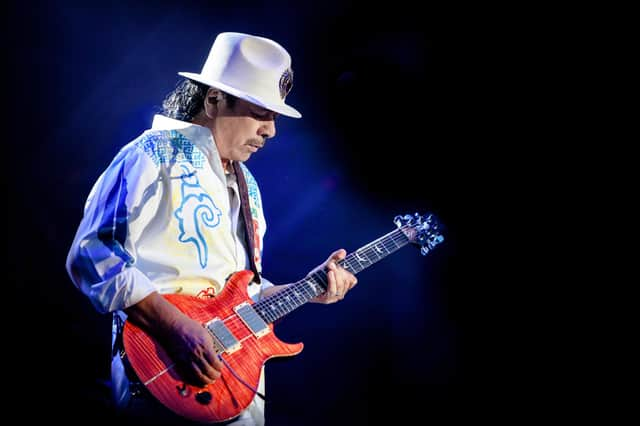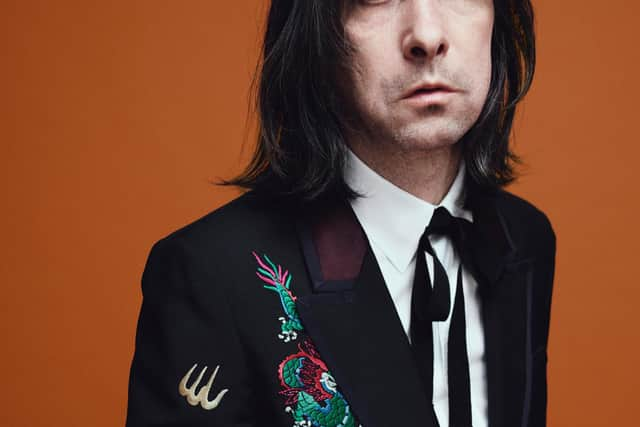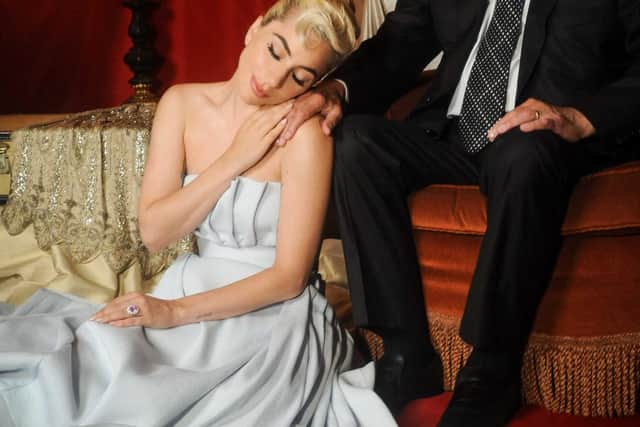Album reviews: Santana | Primal Scream | Tony Bennett & Lady Gaga


Santana: Blessings and Miracles (BMG) ***
Primal Scream: Demodelica (Sony) ****
Tony Bennett & Lady Gaga: Love For Sale (Columbia/Interscope) ***
Veteran musical shaman Carlos Santana brings the good vibes and the healing hands on latest album, Blessings and Miracles. Have the last 18 months changed him? Not demonstrably so, as opening track Santana Celebration establishes that he still parties like it’s 1969 with searing guitar work, funky Hammond organ, energetic percussion and Latin flair.
Advertisement
Hide AdAdvertisement
Hide AdRumbalero lives up to its hybrid title by adding some synthesizer embellishments and vocal effects but it’s essentially another vibrant fiesta on which he is joined by his son Salvador Santana and Asdru Sierra of the similarly eclectic Ozomatli.
Santana does not so much blur musical boundaries as work across many styles, so country rocker Chris Stapleton is deployed to bring a rootsy rasp to the clinical reggae rock of Joy. He reunites with Smooth singer Rob Thomas for the forceful AOR number Move, gussied up with excessive wah-wah, and makes a meal of Whiter Shade of Pale only to find that there is nothing he nor guest vocalist Steve Winwood can add to this standard.
In contrast, he leaves enough space for former Fifth Harmony member Ally Brooke to mine her inner Gloria Estefan on slow jam Break, while still showcasing his virtuosity. Following some rote writing from Diane Warren on the snoozy She’s Fire, righteous Living Color frontman Corey Glover provides a rude awakening on Peace Power and Santana pours more molten riffola on America For Sale, trading licks with Metallica’s Kirk Hammett while Death Angel frontman Marc Osegueda chews the scenery.


Following this maximalist display, what remains but to show off his Latin jazz chops with the late Chick Corea and his wife Gayle Moran Corea on the closing Angel Choir/All Together – no less derivative in its way than the Hendrix-style blues rocker Mother Yes but closer to the cosmic creativity he claims as his inspiration.
In 2003, The Scotsman published a list of the hundred best Scottish albums, topped by Primal Scream’s modern classic Screamadelica, which celebrates its 30th birthday this autumn with reputation undimmed. Among a brace of commemorative releases, Demodelica is the pick for forensic fans keen to hear alternative mixes from the original sessions.
The Movin’ On Up demo is a little more sluggish than the finished article but still packs some natural soul until the tinny screech of brass intrudes on the outro. The trippy Higher Than The Sun appears as an electro baroque instrumental and then with Gillespie’s breathy vocal, while Don’t Fight It Feel It features in groovy spy movie incarnation by producers Hypnotone.
For an insight into the development of the album’s lysergic sound, compare the cosmic country roots of I’m Coming Down, featuring little more than plangent guitar, the patter of bass, clink of tambourine and a baritone Bobby, with its dreamy electrified version. The a cappella take of Inner Flight is pure rhapsodic Beach Boys, while the prominence of harmonium and chimes on Shine Like Stars creates a magical kids TV soundtrack. Only the funky drummer shuffle of the title track, which featured on the Dixie Narco EP rather than the album, tethers the sound to the early 90s – everything else has aged gracefully.


Advertisement
Hide AdAdvertisement
Hide AdSpeaking of graceful ageing, veteran crooner Tony Bennett releases his final album, a stroll through the Cole Porter songbook in the company of shape-shifting diva Lady Gaga who effortlessly helms Do I Love You, showing off the different shades of her versatile voice, sometimes over the course of one line. For his part, Bennett remains sufficiently vocally spry if inevitably weathered in his tone. The big band arrangements are generally impeccable, though the jazz hands Love For Sale fails to capture the seediness of the song.
CLASSICAL
Ronald Center: String Quartets (Toccata Classics) ****
The conductor Walter Susskind described Aberdeenshire composer Ronald Center (1913-73) as “the most modest composer I have ever met”. It’s perhaps that self-effacement, combined with the freedom of being self-taught and reluctance to venture away from his quiet Huntly existence, that gives Center’s music – ranging from numerous piano works and songs to orchestral pieces – its personable charm. As this illuminating Toccata Classics survey of his three string quartets illustrates (volume two of a wider tribute), there is an unmissable naivety in his music – a tendency to become stuck too long with a singular idea – but equally an ingestion of contemporary modernist styles (gritty Bartok and Shostakovich softened by soulful nods to Vaughan Williams) and characterful infusion of idiomatic Scots that add flair and character to its underlying honesty. The Fejes Quartet make a strong and stirring case, from the torturous wartime First Quartet to the freer-flowing sentiments of the Third. Ken Walton
JAZZ
Mathias Eick: When we leave (ECM) ****
There’s a wistfulness, a sense of melodic yearning, that informs Norwegian trumpeter Mathias Eick’s tenderly honed tone, at times reminiscent of the voice-like melancholy of an Armenian duduk. Here, amid a well-chosen septet, the opening Loving sets the tone, with lyrically murmuring trumpet, Håkon Aase’s violin adding an edgy, sinuous presence and Stian Cartensen painting in swells of steel guitar, as bustling drums keep things shifting. The folk song-like refrain of Caring gives way to Andreas Ulvo’s piano ranging eloquently over steel guitar sighs and drum hustle, while Arvo, presumably a nod to the Estonian composer, sees wordless vocalising from Eick before things build up dramatically over inexorable snares. Flying, on the other hand, encloses spare trumpet in a still, spacy realm of piano chimes and percussion taps, while Begging brings the album to a lingering, hymn-like close. Jim Gilchrist
A message from the Editor
Thank you for reading this article. We're more reliant on your support than ever as the shift in consumer habits brought about by coronavirus impacts our advertisers.
If you haven't already, please consider supporting our trusted, fact-checked journalism by taking out a digital subscription at https://www.scotsman.com/subscriptions